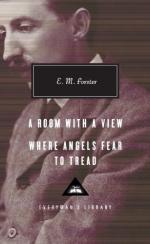“Most awfully.” And by this bald interchange they convinced each other that Romance was here.
Harriet, meanwhile, had been coughing ominously at the drop-scene, which presently rose on the grounds of Ravenswood, and the chorus of Scotch retainers burst into cry. The audience accompanied with tappings and drummings, swaying in the melody like corn in the wind. Harriet, though she did not care for music, knew how to listen to it. She uttered an acid “Shish!”
“Shut it,” whispered her brother.
“We must make a stand from the beginning. They’re talking.”
“It is tiresome,” murmured Miss Abbott; “but perhaps it isn’t for us to interfere.”
Harriet shook her head and shished again. The people were quiet, not because it is wrong to talk during a chorus, but because it is natural to be civil to a visitor. For a little time she kept the whole house in order, and could smile at her brother complacently.
Her success annoyed him. He had grasped the principle of opera in Italy—it aims not at illusion but at entertainment—and he did not want this great evening-party to turn into a prayer-meeting. But soon the boxes began to fill, and Harriet’s power was over. Families greeted each other across the auditorium. People in the pit hailed their brothers and sons in the chorus, and told them how well they were singing. When Lucia appeared by the fountain there was loud applause, and cries of “Welcome to Monteriano!”
“Ridiculous babies!” said Harriet, settling down in her stall.
“Why, it is the famous hot lady of the Apennines,” cried Philip; “the one who had never, never before—”
“Ugh! Don’t. She will be very vulgar. And I’m sure it’s even worse here than in the tunnel. I wish we’d never—”
Lucia began to sing, and there was a moment’s silence. She was stout and ugly; but her voice was still beautiful, and as she sang the theatre murmured like a hive of happy bees. All through the coloratura she was accompanied by sighs, and its top note was drowned in a shout of universal joy.
So the opera proceeded. The singers drew inspiration from the audience, and the two great sextettes were rendered not unworthily. Miss Abbott fell into the spirit of the thing. She, too, chatted and laughed and applauded and encored, and rejoiced in the existence of beauty. As for Philip, he forgot himself as well as his mission. He was not even an enthusiastic visitor. For he had been in this place always. It was his home.
Harriet, like M. Bovary on a more famous occasion, was trying to follow the plot. Occasionally she nudged her companions, and asked them what had become of Walter Scott. She looked round grimly. The audience sounded drunk, and even Caroline, who never took a drop, was swaying oddly. Violent waves of excitement, all arising from very little, went sweeping round the theatre. The climax was




